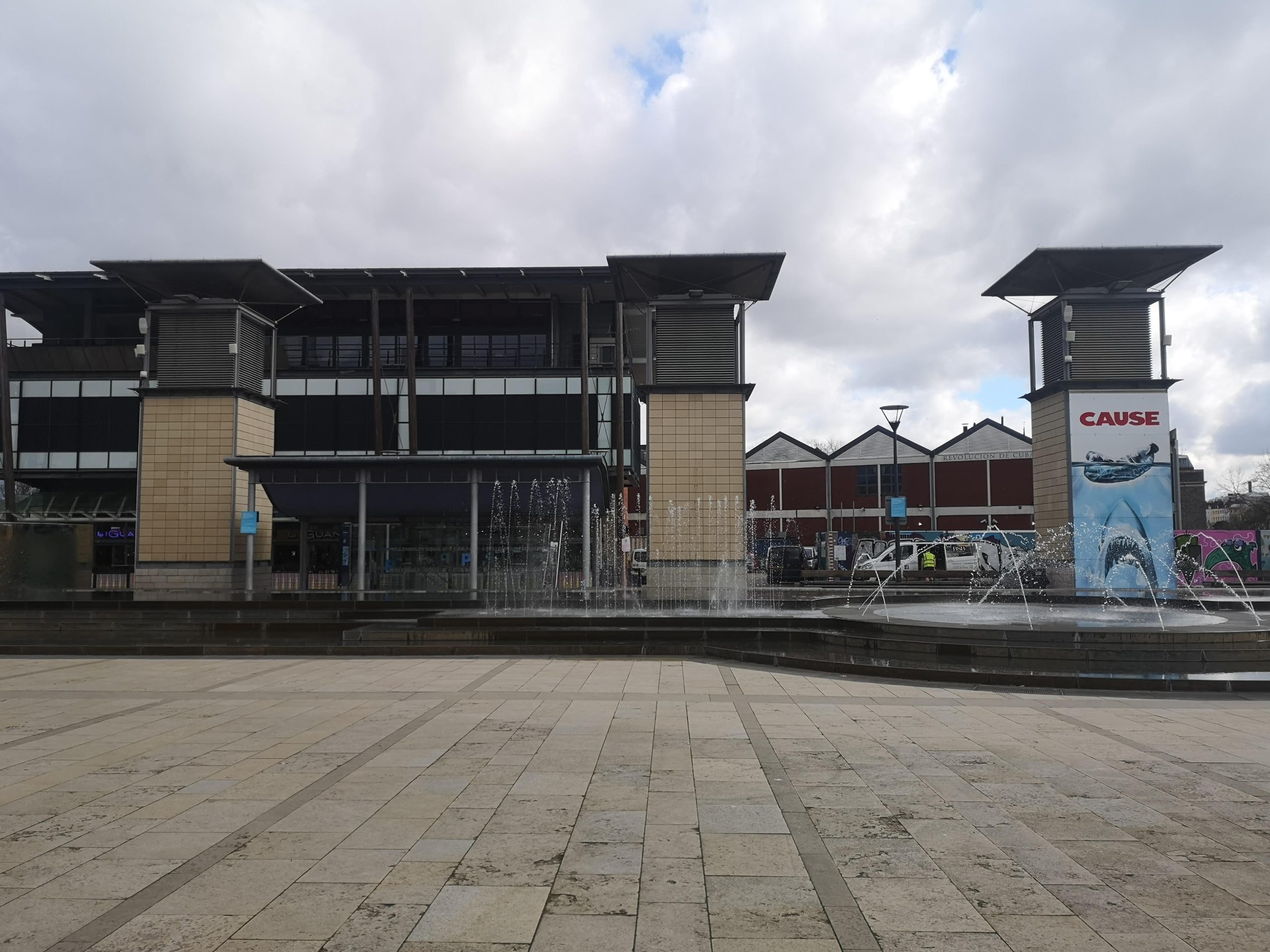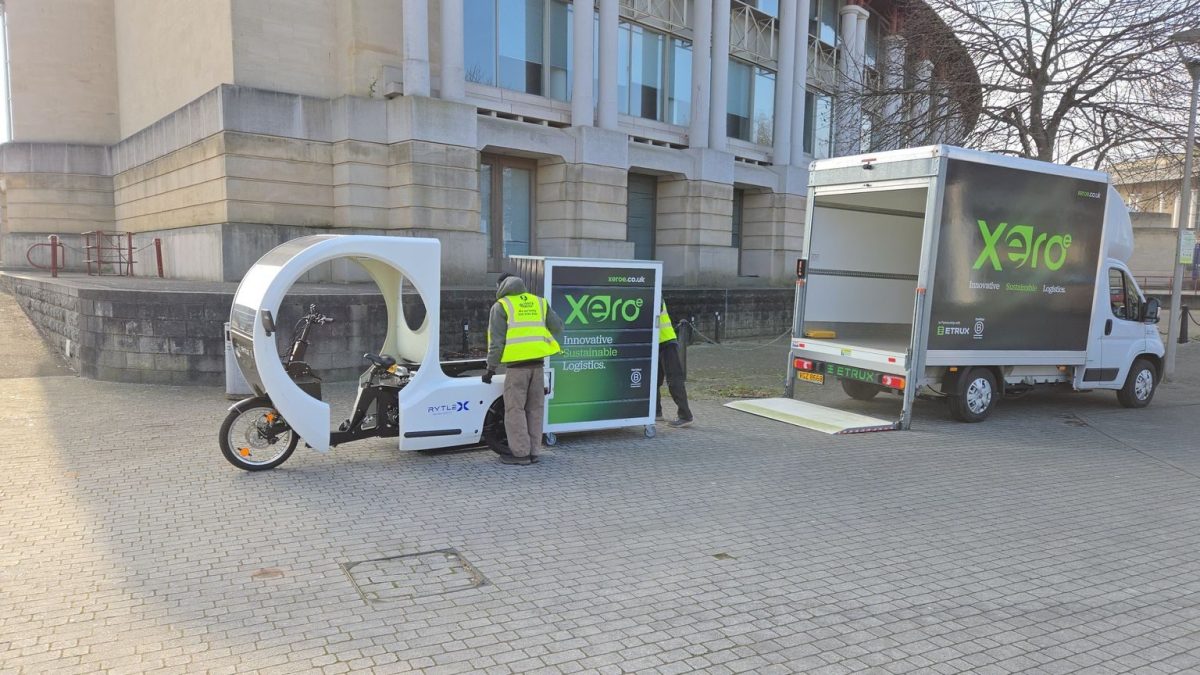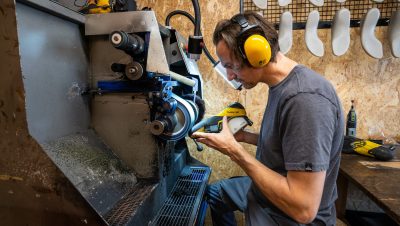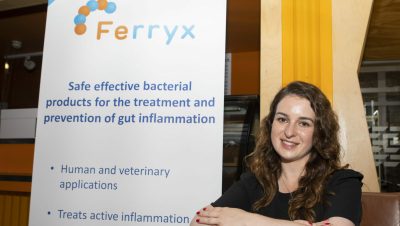News / Cargo bikes
Containerised cargo bike trial sets ambitious targets
A five-week cargo bike trial in Bristol has set an ambitious goal of drastically reducing van deliveries in urban areas in order to improve air quality.
Delivery firm XeroE and logistics company Whistl have joined forces for the trial, testing a sustainable delivery system in Bristol using containerised cargo bikes and virtual logistics hubs.
According to XeroE, maintaining virtual hubs is straightforward and requires minimal space (just three parking spaces). These hubs are designed to be simple to operate, with little hassle.
The trial was recently unveiled to the press at Millennium Square, followed by a media briefing at We The Curious.
Bristol24/7 spoke with Steve Evans, founder of XeroE, who was upbeat about the trial’s results and the potential to scale up.
The virtual hubs, which serve as temporary drop-off and collection points, aim to reduce reliance on diesel vans, cutting down on air pollution, congestion and emissions.
According to Evans, the trial demonstrates that cargo bikes, in combination with virtual hubs, can replace a significant number of van deliveries. This could potentially account for 50 per cent of urban deliveries, offering a scalable, cost-effective solution for logistics.
For Evans, however, it is much more than just a business venture.
Evans recalled the origins of XeroE: “When I lived in London, I was in Richmond, a lovely, leafy area. I then moved to Elephant and Castle, right in the heart of the city, partly to be closer to some of my grandchildren.
“It was then that I realised just how bad the traffic and fumes were. I did some research and thought, ‘Goodness, we really should be moving out of London—it’s that bad.’”
“This was in 2018, and in 2019, I set up a business focused on emission-free deliveries. The aim was to offer companies who wanted to act ethically and improve the environment the chance to book deliveries without relying on services using diesel vans—or even electric vans that were sometimes replaced with diesel ones.”

Steve Evans was inspired to launch XeroE due to a personal experience some six years ago – photo: Milan Perera
Evans was pleased with the trial’s outcome despite few glitches. With plans to have 30 cargo bikes, he aims to remove 30 vans from the roads, expecting the next phase of XeroE to be a “game-changer”.
He said: “The trial lasted five weeks, and overall, it’s been successful. We encountered a few glitches with the equipment, but that’s to be expected in a trial.
“However, we’ve proven that this system works. Our target for the ‘pit stop’—as we call it—was eight minutes, and we managed to reduce it to ten minutes, so that’s a good result. Whistl, our client, is pleased with the outcome and wants us to continue.”
“We’re also looking to expand the number of virtual hubs across Bristol, aiming for 30 in total. This would allow us to remove 30 vans from the roads and prevent them from entering the city in the first place.”

The Millennium Square was one of the virtual hubs of the five-week trail of containerised cargo bikes – photo: Milan Perera
This is not the first attempt at using cargo bikes in Bristol, but Evans believes previous initiatives may have struggled due to the need for permanent hubs, which are costly to maintain. The virtual hubs, on the other hand, offer a more seamless and cost-effective solution for transitioning from EV vans to cargo bikes in smaller spaces.
Evans explained: “Today, we’re demonstrating our trial using containerised cargo bikes in Bristol. What this means is that for every cargo bike we put on the road, we’re reducing the number of vans coming into Bristol for deliveries in urban areas.”
“We can achieve this because we use containerised cargo bikes. The containers are packed in Whistl’s facility in Patchway, where I’m from, and pre-sorted by route. They’re then picked up by a van and delivered to virtual hubs around Bristol.”
“These virtual hubs are small spaces, roughly the size of three car parking spaces, where the van stops and drops off a few boxes. The specialised cargo bikes then pick up the boxes and make local deliveries just down the road.”
He continued: “One of the key objectives of this trial was to prove that this system works and is economically viable. Currently, only 10 per cent of cargo deliveries in urban areas are made using cargo bikes. This could rise to 50 per cent if we can make it economically sustainable.
“We’re doing this by avoiding permanent hubs in the city centre and instead using virtual hubs, which are only needed for about ten minutes a day.”
With Bristol’s clean air ambitions still at the forefront of local discussions, including debates over the Clean Air Zone (CAZ) and bus gates, Evans believes XeroE’s cargo bikes can play a significant role in improving the city’s air quality.
He said: “Our company’s mission is to clean up urban air, with a particular focus on reducing particulate matter, especially PM2.5, which is harmful and can enter children’s lungs. This is the pollution we aim to reduce.
“Cargo bikes produce minimal pollution and particulate matter. While there is some from the tyres and brakes, it’s negligible compared to a diesel van.”
“Our goal is to have 30 cargo bikes replacing diesel vans, which would make a substantial impact on the air we all breathe.”
Evans also highlighted the “human cost” of air pollution: “Each cargo bike can contribute to saving 72 days of human life per year. Over the years, we’ve completed nearly two million emission-free deliveries, saving the equivalent of ten years of people’s lives.”
The trials took place from the virtual hubs at Millennium Square and Nelson Street.
Evans concluded: “For this trial, we have two virtual hubs in Bristol: one on Nelson Street and the other in Millennium Square, courtesy of We The Curious.”
“Yes, it’s right there in Millennium Square, a very public area. You may have seen our electric van and cargo bikes swapping boxes.”
“In addition, we’ve worked on another trial where we placed a box onto a train in Birmingham, sent it to Glasgow, and then delivered it from there. Our aim is to combine this rail and containerised cargo bike system, offering an emission-free delivery from source to front door.”
The trial was supported by the Department for Transport’s Freight Innovation Fund.
Main photo: XeroE
Read next:
 Our newsletters emailed directly to you
Our newsletters emailed directly to you




















